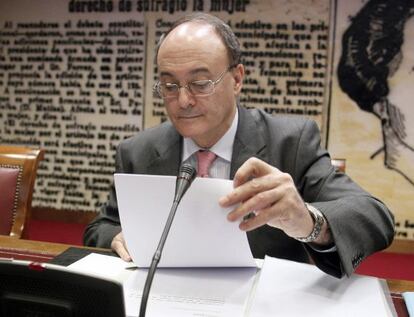Worst of recession behind us, says Bank of Spain chief
Governor also to leave decision on floor clauses to lenders

The governor of the Bank of Spain, Luis María Linde, said on Thursday that he would be leaving the banks to decide whether or not they should remove so-called “floor clauses” from mortgage contracts. The controversial conditions, which prevent interest rates on home loans from falling below a certain level, were found to be illegal by the Supreme Court last month.
Linde’s comments come after Economy Minister Luis de Guindos announced on Tuesday that he had asked Spain’s central lender to ensure that all banks remove floor clauses. Three lenders have so far taken the measure — BBVA, Cajamar and Novagalicia — as they were directly affected by the court’s May 9 ruling, which stated that such small-print conditions lacked transparency.
Speaking in Congress on Thursday, Linde said he would call on banks to “analyze the situation and examine which cases are legal from the point of view of the sentence. If [the clauses] are not legal and there are doubts, they must be removed,” he said.
The governor, who was in Congress to present the Bank of Spain’s annual report, said that he would call on the Spanish Bank Association (AEB) and the Spanish Confederation of Savings Banks (CECA) to study floor clauses in mortgage contracts.
In response to questions from members of a congressional committee, Linde argued that the Supreme Court ruling does not mean that floor clauses cannot be included in mortgage contracts, but rather that any that are found to lack transparency will be declared null and void.
Linde added that the Bank of Spain will be monitoring the effect the ruling has on the results of Spanish banks. “We are interested in seeing that data from the point of view of the supervisor,” he said. “We are going to monitor what happens and how the Supreme Court ruling is observed.”
Credit cannot be a product of rules that ignore the economic realities"
Speaking during the same presentation, Linde proclaimed that “the worst phase of the second recession [in Spain] is now behind us,” adding that the Spanish economy would return to positive growth between July and September. Spain was plunged into the worst downturn in living memory in 2009, and after a mild recovery over the following two years, slipped back into recession in 2012.
“The latest data indicate a moderation in the contraction of GDP,” said Linde, bringing his views in line with the optimism expressed over recent days by members of the government and the business sector.
He warned, however, that the financial crisis is still far from resolved, and that until that was the case, there was unlikely to be an easing in credit conditions for small- and medium-sized companies.
“Credit cannot be a product of administrative rules that ignore the economic realities, or that lead to erroneous decisions from a solvency point of view, and that includes the public entities,” he said.
During the presentation of the annual Bank of Spain report, the governor also warned that it was necessary to continue with reforms, in order for Spain to become more competitive in order to stimulate growth.
“In order to return to economic growth, investment needs to be stimulated, jobs need to be created,” he said. “For the banking and financial crisis to be solved we need a strong legal system, and as such I would like to take advantage of this occasion to call for it to be protected and reinforced,” he added, in reference to the large number of changes to the regulations made by the bank of Spain in recent months.
Tu suscripción se está usando en otro dispositivo
¿Quieres añadir otro usuario a tu suscripción?
Si continúas leyendo en este dispositivo, no se podrá leer en el otro.
FlechaTu suscripción se está usando en otro dispositivo y solo puedes acceder a EL PAÍS desde un dispositivo a la vez.
Si quieres compartir tu cuenta, cambia tu suscripción a la modalidad Premium, así podrás añadir otro usuario. Cada uno accederá con su propia cuenta de email, lo que os permitirá personalizar vuestra experiencia en EL PAÍS.
En el caso de no saber quién está usando tu cuenta, te recomendamos cambiar tu contraseña aquí.
Si decides continuar compartiendo tu cuenta, este mensaje se mostrará en tu dispositivo y en el de la otra persona que está usando tu cuenta de forma indefinida, afectando a tu experiencia de lectura. Puedes consultar aquí los términos y condiciones de la suscripción digital.








































